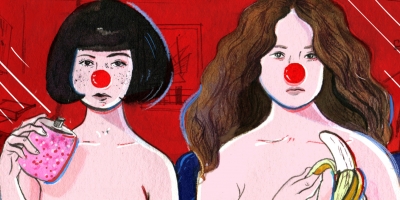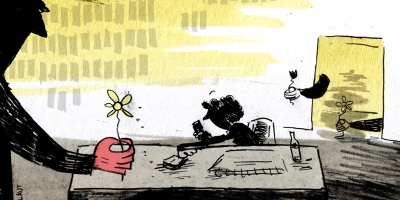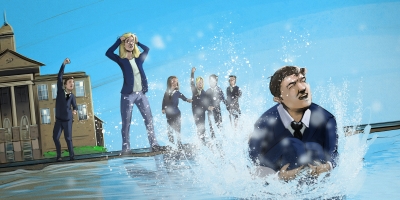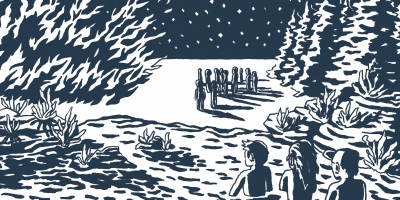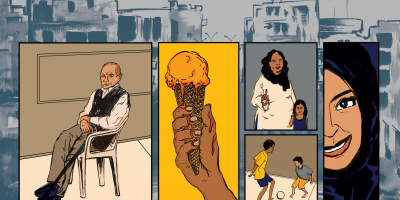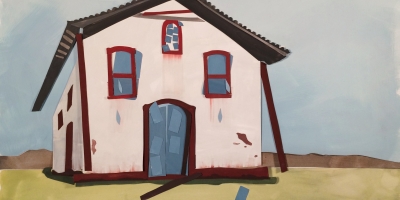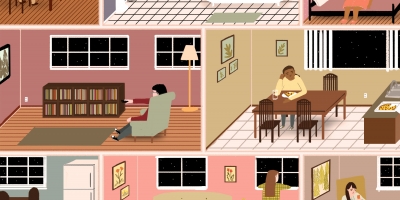Nonfiction
Penance
by Lorena Piñeiro

Most lives are like something out of an old country song. There is love, there is death, there is booze. And then there is religion.
Like moss, my family grew on a mountain. In the utmost northwest of Spain, they set down roots so thick that only despair could rip them out. I assume that a heavy heart was what made both my maternal and paternal grandparents leave Galicia for good, their suitcases filled with winter clothes that would do no good in their new homeland, Brazil. These four people, who would one day bring my mother and father into existence, didn’t travel at the same time; in fact, they hadn’t even met yet. But for narrative purposes, let’s imagine our fantastic squad gathered in the bow of the ship, hair blowing in the wind, nostrils expanding to take in the salt air, with that same look of determination and sheer panic shared by all immigrants. Picture them all clinging to tiny crucifixes, asking for reassurance from the heavens.
Galicia was once a place where people went about their pagan business unafraid of being burned at the stake. That changed around the time the Romans felt like adding a new province to their ever-expanding empire, at which point Latin culture and Catholicism were—how can I put it?—strongly endorsed. Weird little place that it was, Galicia never truly lost its magic. To this day, folks drink punch in the dead of night while chanting spells about barn owls and toads. This witchy version of Catholicism was best suited for an eerie, cold mountain, and so it was left there. My grandparents brought to Brazil only the saints who had the church’s seal of approval and who seemed reliable enough for such an expedition.
I have always wondered if I come from the pagan people who lived there before there was even a Christ to be praised or if I am just another descendant of the cross-bearing Romans. Either way, it doesn’t matter. Conquered or conqueror, we are all damned.
Let’s flash forward to when that bunch of ex-neighbors came to meet on another continent. Watch the time-lapse of a hundred and something seasons beginning and ending, clouds passing by at maximum speed. Pause. I was just born. That’s me over there, by the nursery, crying my lungs out. A little bundle of anxiety.
I was a kid who couldn’t be left alone without thinking I’d been abandoned, even though I had the most loving parents a child could ask for. It doesn’t take a genius to connect the dots between my primal fear of rejection and my lifelong struggle for perfection. Whenever I failed, I would crumble to pieces so little that some of me might have gotten lost on the way here. Guilt washed over me like a wave in the ocean, sharks and all.
I don’t know what made me so vulnerable to the concept of penance. Maybe it was just nature. The thing about guilt is, much like the depression that isolates Esther Greenwood, it acts like a bell jar. It puts out the flame of the candle. It consumes you. But nurture made an already nasty feature even worse. Here’s a little riddle for all you science geeks out there: What do you get when you mix an obsessive child with Christian dogma and give it a little shake? A Molotov cocktail, that’s what.
As they set off in pursuit of the not-so-glamorous Brazilian Dream, my grandparents must have felt God’s hand guiding the ship as if it were a toy. Their devotion only grew once they settled here. I believe they needed something familiar and reassuring to hold onto in this tropical setting. That’s how both my parents ended up being raised by people who hung framed pictures of Pope John Paul II, the one who looked like Santa Claus.
My mom and dad became the kind of Catholics who would hit the snooze button on Sundays instead of going to a tedious morning mass, but I was still raised in the church. I went to a Catholic school simply because it was the best place available in São Gonçalo, the semi-rural suburb of Rio de Janeiro where I grew up. The city is named after a saint, and so was the school. There was a little chapel inside of it, and we kids would line up before it every day to sing hymns. My favorite was the one about fearing no evil even while walking through the valley of the shadow of death. It had that touch of the Southern Gothic that I would later come to appreciate in fiction. I sang enthusiastically, louder than the other children—I even clapped along with the rhythm. I liked the lyrics, and I liked to be the best.
And because that daily worship service took place in a school, I regarded it with the same seriousness with which I did my math homework. School was where I came to learn from adults who knew better. Everything was important. Everything was true. Everything was mandatory. My catechism classes took place in the same room where I learned there were nine planets in the solar system. There was no discernible distinction between science and faith. Jesus was resurrected on the third day, Moscow is the capital of Russia, Mother Mary gave birth to our Lord while still a virgin, and two plus two equals four.
Our teachers required proof that we were going to church. Every Sunday, I would drag my mom and dad out of bed and into the chapel, where we would stay until the end of the service in order to get the priest’s signature. That was the only way my teachers would believe I was there—they’d made it very clear that I was not to be trusted. Children and women are never to be trusted.
But I wanted to be there. The whole place filled me with wonder: reverence and deference. Like a person who peeks through a telescope at the stars, I felt small in all the different meanings of the term. Insignificant, petty, weak, and so very young. The high-vaulted ceilings made me weirdly claustrophobic, as if the air were heavy with memories of past, present, and future shame. As if the kneeling people were kneeling simply because they couldn’t stand, their backs bent with the weight. The long aisles distanced me from the holy altar where only the godly could stay. I used to follow the small wooden plaques depicting the fourteen stations of the cross while wondering how Jesus could have been so wronged. I would do right by His name.
I made little girlish doodles in the margins of my Bible: hearts and flowers and stars drawn with the same yellow marker that I used to highlight the most valuable passages, the ones that taught you how to stay away from hell. My parents didn’t see this dedication as anything alarming—why should they? They couldn’t peek inside my nine-year-old brain and see how obsessed it was with dissecting my every action and thought in search of sins that needed atonement.
Before my first trip to the confessional—a rite of passage!—I spent days cataloguing my sins to make sure I wouldn’t forget anything: the stolen doll, the name-calling, the bruises on my little brother’s knee, the childish rebellion against my mother. I listed my sins going back to the womb. The booth smelled like mold and fear. My nostrils wrinkled at the musky scent of wickedness. Sins didn’t just vanish in the air; they turned into fumes. Even though my silly crimes seemed to bore the priest out of his mind (I can imagine him thinking, “Give me some real stuff to work with, kid!”), he was kind enough not to dismiss my pain and uneasiness about telling a grownup all my dark little secrets. And not a regular grownup, whose only power was to give you a scolding. This one had God on speed dial. My penance was a couple of Our Fathers and five Hail Marys, a pretty cheap fine in Catholic currency for a first-time offender. If you ask me, I got off lightly.
My teachers told me that after being absolved, you were holy for the brief period of time until you sinned again. Talking to a priest was like bleach for the soul. It left you clean and pure. Perfect. I was determined to stay that way. My brother teased me, and I made an effort not to yell back at him and ruin my saintliness. Do not make me sin, you little brat! I’m not going to waste my holy breath on you.
It’s amazing how Christianity can lift you up and smack you down in the same split second. I simultaneously loved myself for being a good servant and hated myself for not being good enough.
Here’s what might be a crucial piece of information: I have OCD. As a kid, I would get out of bed in the dead of night to turn the hallway lights on and off exactly five times. The last words I had to say before falling sleep were “good night,” even if it was just to the ceiling fan. (I bet whoever wrote Goodnight Moon didn’t have that in mind.) I had dozens of little rituals that only made sense to me. If my parents had watched more horror movies, they might’ve been properly terrified when I casually mentioned the terrible consequences that would befall me if I didn’t follow my set of imaginary rules.
Once religious practices came into the picture, my routine went through a few changes. Instead of getting out of bed to mess with the light switch, I now had to pray the Our Father exactly five times. Every time I saw a church or a cemetery, I had to make the sign of the cross. There was a little statue of Jesus on the sideboard that I had to kiss three times before I left the house. My repetitive and compulsive behavior ran into Catholicism and wore it like a glove.
I was okay with the counting and checking and the magical beliefs. It was the intrusive thoughts that always got to me. The way I constantly analyzed and questioned anything that popped into my head. With Catholicism, I had a new lens through which to observe these thoughts: Were they virtuous, or were they sinful? Would they send me to heaven or hell? Even if I didn’t act on them, I was already dirty.
In addition to the obsessive thoughts, I had totally normal but totally terrifying preteen thoughts. Mostly about boys, and the things boys and girls did together on television. I pictured myself in those scenarios, then shook my head as if to erase the images. It felt like a gas leak in my once immaculate brain, pollution that couldn’t be stopped.
One day I heard a word being whispered back and forth by my friends. You know the one, it rhymes with abomination: masturbation. I checked the dictionary to see what the fuss was all about and—surprise, surprise—it had to do with sex. That didn’t shock me at all, since most of my peers seemed to be over the whole church thing. Fine by me, I wasn’t the one going to hell. If it had to do with sex, it had nothing to do with me.
But then why did its meaning evoke the memory of an action and the memory of a feeling? Something familiar, something innocent, something kids instinctively do. I cried as if my body could be washed clean by the tears. I ran to my mom’s bedroom, hugging the dictionary and yelping, “I didn’t know, I swear I didn’t know!” Eve had been warned about the apple, but nobody had told me about this. My mom just took me in her arms and told me there was nothing wrong with it. Shh, baby, you are not going to hell. Not over this, Mom? Not over anything, baby.
I didn’t fully believe her, but still I felt a bit reassured. Since I couldn’t confess my horrible crimes to a priest for fear he would forever ban me from heaven and earth and probably outer space too, I needed someone else to absolve me. A new ritual went into my repertoire: the moment anything remotely sinful went through my head, I had to tell my mom. I’d knock on her door in the late hours of night saying, “I just thought of a bad thing!” That went on for weeks.
Having struggled with a lifetime of undiagnosed depression and OCD herself, my mom knew better. She took me to a therapist, she pulled me away from the things that were doing me harm, she blamed herself for not noticing before. I felt so lonely, so isolated by my previous self-righteousness, and now by my shame, my fear. She found a way to slip though the cracks of my brain and keep me company.
You know those kids who, after years of repression, suddenly dye their hair pink and listen to death metal? I wasn’t one of them. This Molotov cocktail exploded inward. I slowly left the church, but the guilt never left me. It opened a crater that separated me from my teenage friends; their shared experiences of pleasure and pain weren’t mine. All I could do was wave from the other side.
I don’t know if I’m an atheist or an agnostic, and frankly I don’t care. I still have obsessive thoughts guided by guilt and a hard time distinguishing pleasure from shame. I’m working on that, but I wasn’t even sure if I could actually write this essay. I fear my mom and dad will read it and feel guilty for not realizing how this doctrine that they didn’t even fully endorse damaged their kid. And then I would feel guilty for inflicting this knowledge on the people I love the most. And then they would feel guilty for accidentally hurting me. That’s another thing about guilt—you pass it on unwittingly to generation after generation, like a family heirloom.
Well, I am breaking the cycle.
A few years ago, I visited the continent my grandparents left behind and came upon the most beautiful church I had ever seen: Cathédrale Notre-Dame de Paris, one of Catholicism’s finest jewels. It was dark and somber, the walls made of stone. I know the stone was cold because I touched it all; engraved apostles, martyrs, virgins, and angels led the way. Stained-glass windows filtered the sunshine, but the images seemed to beam their own light. There were the same high-vaulted ceilings I’d grown up with in São Gonçalo. There were the same long aisles that rose to a crescendo as you approached the cross.
I was surprised to notice I was weeping. But it wasn’t out of fear or guilt or the weight of years and years of self-condemnation. I cried because I was surrounded by all the things that once made me shiver in terror, and now all I could think was, “This architecture is amazing.”
